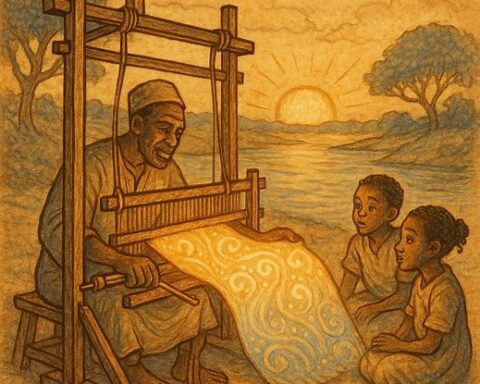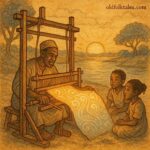Once upon a time, in a small village near the forests of the Congo, a man cleared a vast piece of bushland and asked his wife to plant it with cassava. The fertile ground promised abundant food for the family, and she worked diligently to tend the crop. Months passed, and soon the cassava roots grew ripe for harvest. But when the woman went to her farm, she discovered her hard work was being destroyed, bush pigs and other wild animals had been raiding the fields, tearing up the root’s night after night.
Frustrated, she returned home to her husband and shared her sorrow. The man, determined to save their food, decided to dig a great pit as a trap for the animals. He worked steadily, carving a wide, deep hole in the earth. As he laboured, an Imp, a mischievous spirit of the forest, appeared and asked what he was doing.
When the man explained, the Imp offered to help. Fearing refusal might bring harm, the man agreed. The Imp then proposed a bargain: all the male animals caught in the trap would belong to the man, while all the female animals would belong to the Imp. The man, thinking this deal would favour him, agreed without hesitation.
The Trap and the Bargain
The next morning, they checked the pit. Inside lay a male bush pig. True to their agreement, the man claimed it. The same thing happened day after day, antelopes, buffaloes, and more bush pigs, all male. The man mocked the Imp, laughing at his poor bargain: “You are foolish. Do you not know it is only the males that wander for food?”
READ: The Gazelle’s Clever Quest for a Wife: A Congolese Folktale
The man returned home each day with meat, and soon the village was well-fed. But his wife reminded him that they still lacked cassava bread to eat with the meat. She promised to dig roots from the farm the next morning.
A Dangerous Discovery
At dawn, the wife left with her basket and hoe to the field. The husband stayed behind to care for their little son. After some time, the boy began to cry, and the man decided to carry him to his mother. As he approached the farm, he heard joyful singing. The Imp was leaping and dancing near the pit, chanting: “O my, O my, at last I have a female animal in the trap!”
Curious, the man hurried forward. But when he looked into the trap, his laughter turned into horror, his wife was at the bottom of the pit. He cried out in anger, accusing the Imp of cheating. “My wife is no animal!” he argued. But the Imp insisted: the bargain was clear—males to the man, females to him.
The dispute grew heated. Both shouted fiercely until, unexpectedly, the little boy spoke up.
The Child’s Clever Judgment
“Father,” said the boy, “you made a bargain. All male animals are yours, and all female animals belong to the Imp. You have taken many animals already, but the Imp has received none. Let him take this one.”
The Imp was astonished. “Is this wise judge truly only a child?” he asked, moved by the boy’s fairness. Eager to claim his prize, the Imp jumped into the pit to seize the woman. But at that very moment, the boy shouted:
“Look, Father, now a male animal is in the trap, it belongs to you!”
The man realized the truth. By his own rule, the Imp had become the trapped prey. To save himself, the Imp was forced to release all claim to the woman.
The Family Saved
The man pulled his wife from the pit, tears of relief in his eyes. The Imp slunk away in defeat, humiliated by being outwitted by a mere child. From that day forward, the man vowed never to enter into any agreement without fully understanding its conditions.
It was the child’s sharpness, fairness, and courage that saved his mother’s life and restored harmony to the family.
Moral Lesson
This tale teaches that wisdom does not always come from age or strength, it can also come from the innocence and clarity of a child. The boy’s fairness and cleverness outwitted the Imp and protected his family. The story also warns against making bargains without understanding the consequences, as haste and arrogance can lead to danger.
Knowledge Check
Q1: Who were the main characters in the story?
The man, his wife, their child, and the Imp.
Q2: What problem did the family face in their farm?
Bush pigs and wild animals were destroying their cassava crop.
Q3: What agreement did the man make with the Imp?
All male animals in the trap would be his, and all female animals would belong to the Imp.
Q4: How did the Imp try to trick the man?
By claiming the wife, who had fallen into the trap, as his female prize.
Q5: How did the child save his mother?
By cleverly pointing out that the Imp, after jumping into the trap, was himself now an “animal” and belonged to the man.
Q6: What is the central lesson of the tale?
Wisdom and fairness can triumph over deceit, and agreements must be carefully considered.
Source
A Bakongo folktale from the Democratic Republic of Congo, collected in John H. Weeks’ Congo Life and Folklore (1911).







